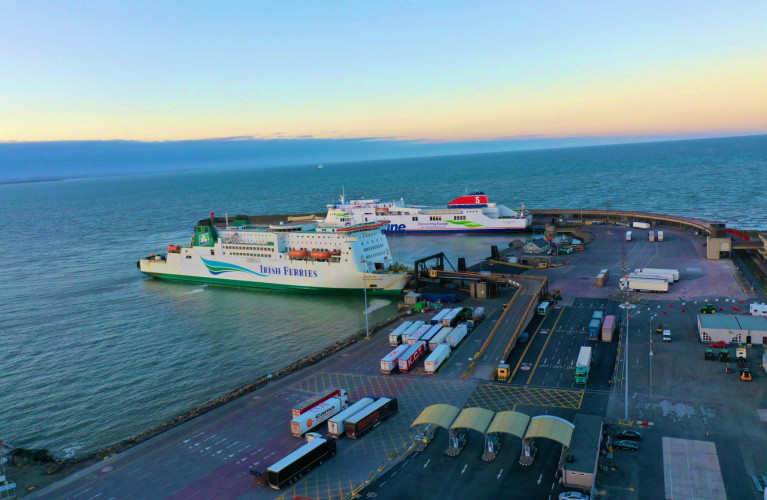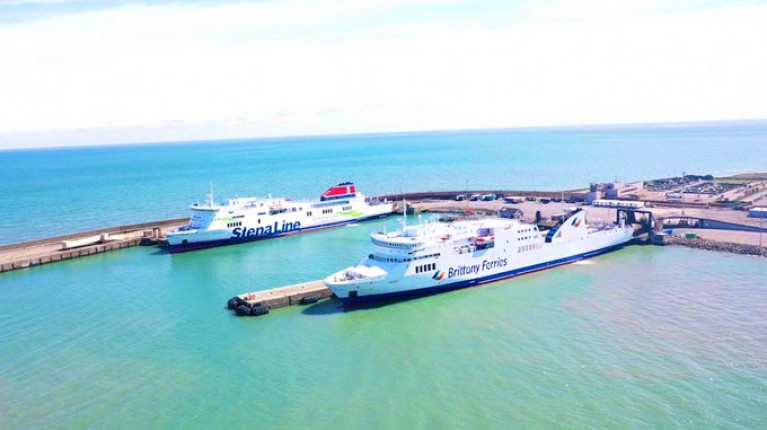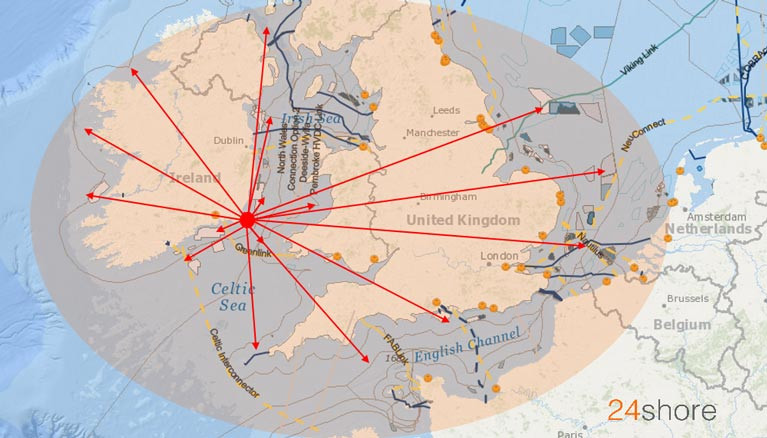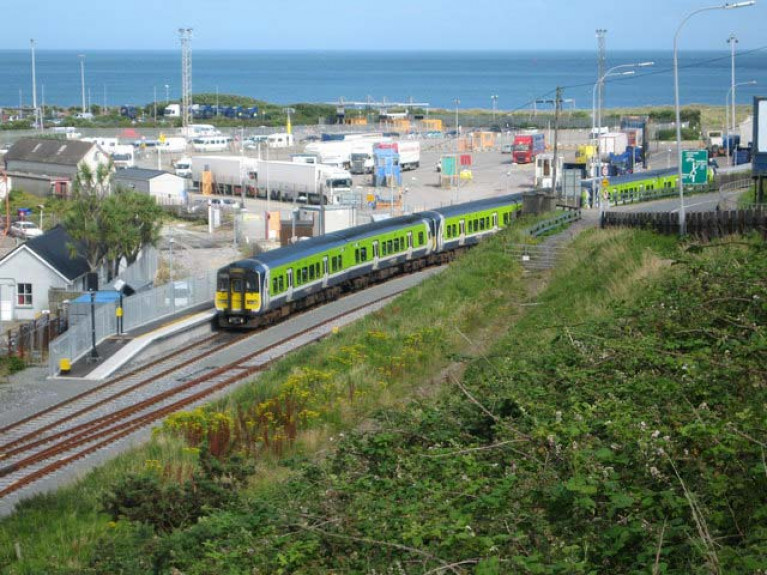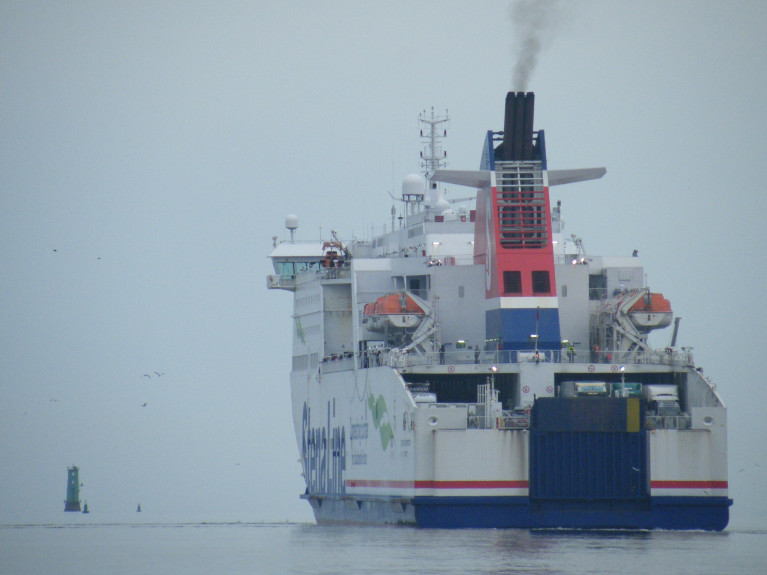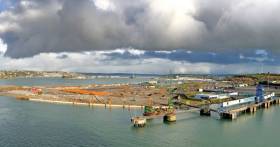Displaying items by tag: Rosslare Europort
Rosslare Europort is where political rivalries have been put aside in a bid to finally see the (ferry) port achieve its potential.
Although Chairman of the Rosslare District Cllr Ger Carthy went head to head with independent TD Verona Murphy in the last election, he is voicing his support for her calls to secure more operators from the harbour (as alluded in Afloat's coverage yesterday).
Having also been outspoken on the subject of the port in recent years, Cllr Carthy, according to the Wexford People, said it was positive to see the issue being driven out there.
'I would support Verona in her endeavours to secure more operators from Rosslare Europort,' he said. 'I don't know if the suggestion of moving Dublin Port down to Wexford will be a runner, it may just be flying a kite, but I'm glad to see Rosslare being raised. Many politicians were happy to raise the issue of the port around election time and haven't been seen since.'
Cllr Carthy believes that the only way that Rosslare Europort can truly progress is by looking at its management.
For more click here of his comments on Murphy and for the south-eastern port.
The ferryport of Rosslare Europort will undergo a €30m transformation over the next five years and is the ideal port to alleviate traffic congestion and lessen pollution in Dublin, according to manager Glenn Carr.
As the New Ross Standard reports, Mr Carr said there are 100 acres of land waiting to be developed within a five kilometre radius of the port, an unrivalled landbank in the country, adding that it makes perfect sense for Dublin Port ships and shipping activity to be moved to Rosslare. Planning permission to develop a new access road and entrance has been submitted, with works due to commence this winter - and combined with major plans by the OPW to develop a customs unit at the port - Rosslare Europort is able to take over 20 per cent of activity from Dublin in the coming years.
Mr Carr said: 'Both outside Dublin Port on the M50 and inside, there is congestion. The current situation is not the norm. The norm prior to Covid saw lorries delayed outside the port and even in the port tunnel. With Brexit approaching we do believe that Rosslare has a very strong role to play as geographically it is the closest port to mainland Europe. Companies can save seven hours, (three and a half hours each way) on the Irish Sea on direct services going to Europe.'
He said the Enniscorthy Bypass has saved hauliers 25 minutes on their journey, adding that the opening of the New Ross Bypass has also strengthened the case for the port. For hauliers travelling to distribution centres along the outer M50 in Dublin, Rosslare is now a lot easier to get to. 'The time you would lose on the ship, you'd gain on the road. The New Ross Bypass provides improved connectivity to Cork, Waterford and Limerick, which are main arteries that a lot of product is moved to. We have seen that with the new Brittany Ferries [Bilbao] service, which moved here from Cork. The biggest factor [behind the move] was that the industry wanted the route in Rosslare because it was easier and quicker to get to so there is already evidence that Rosslare is a real alternative to Dublin.
Presently around 84 per cent of roll-on, roll-off shipping activity occurs in Dublin Port, the remaining 16 per cent falling to Rosslare.
For Carr, there is no other port in Ireland better suited to roll-on, roll-off. because of the better access in and out of the port.
For much more on this ferry development click here.
Afloat adds Brittany Ferries were to have launched a second new route out of Rosslare to Roscoff, but due to Covid-19 the start date has been rescheduled to this month. The inaugural sailing is in a fortnight's time, Monday 15th June.
In the meantime Kerry maintains the year-round Spanish service albeit in a freight-only mode until sailings open to passengers return on Wednesday 17th June.
A Dutch company is to establish an offshore wind supply base at the Port of Rosslare.
In early 2020, XELLZ secured approximately 200,000 sqm of land at the port of Rosslare in the Republic of Ireland. XELLZ has now divided the land into zones and the entire area will be known as Rosslare Europort Business Park (EBP). Through its offshore services subsidiary 24shore and XELLZ Ireland, the Dutch company will establish an offshore wind supply base there to serve and support future offshore wind farms, bringing new energy to the region.
The EBP area has been divided into five different zones (EBP01, EBP02, EBP03, EBP04, and EBP05) which are all situated alongside the new planned access road to the port. The land adjoins the port area, with direct access to the quay, and will be used for offshore supply base operations including pre-installation assembly and mobilisation.
“Today marks the real beginning for this development to serve the future offshore wind farms in the Irish and Celtic Sea. EBP’s land gives direct access to the quay for loading and offloading of offshore wind equipment, and we are now ready to talk to interested parties,” said Petrus (Peter) Bouwhuis, CEO of XELLZ B.V.
The Europort Business Park will become a hive of activity where businesses directly related to the upcoming Offshore Wind Farms (OWF's) can establish themselves. The space offers ample storage and assembly areas to manage the wind turbines, transition pieces and mobilisation equipment. For the future, there is also space available for small to medium enterprises (SME's) interested in providing maintenance, operational, and repair services to this budding renewable energy market.
The Port of Rosslare will be ready to serve the Irish and the Celtic Sea as well as reaching the UK east coast and continental Europe where many OWF's are planned.
The Irish government has set out the country’s clear commitment to reduce carbon emissions with offshore wind expected to play a part. In July 2019 it adopted a Climate Action Plan which specifies, a plan for renewables to provide 70% of electricity generation by 2030. Offshore wind is expected to deliver at least 3.5 GW in support of reaching this target.
At the beginning of December 2019 the Irish Department of Communications, Climate Action and Environment announced details of the first Renewable Electricity Support Scheme (RESS) auction, which has received government approval. The RESS is an auction-based scheme which invites renewable electricity projects to bid for capacity and receive a guaranteed price for the electricity they generate. Subject to state aid approval, the first auction is set to open this year.
XELLZ is a project logistics management consultancy for the heavylift and project logistics industry, streamlining shippers’ processes from A-Z. Through its offshore services subsidiary 24shore, XELLZ offers a number of services to the offshore energy sector including project logistics management, property, personnel and vessel chartering services.
Rosslare Europort has welcomed the announcement by Brittany Ferries that it is to launch its new Rosslare Europort to Bilbao twice-weekly service from 28th February 2020. In addition, the French-owned shipping line will also operate a weekly Rosslare to Roscoff service during the peak season (March to October).
Earlier today, Port of Cork responded to the decision by Brittany Ferries to depart Cork Harbour ending a link from Ireland's second city to Santander in Spain.
The arrival of Brittany Ferries means that Rosslare Europort will now offer business up to seven weekly sailings in each direction between Ireland and mainland Europe, cementing the port’s status as Ireland’s Gateway to Europe.
Brittany Ferries will be Rosslare Europort’s fourth major shipping line customer, and along with Stena Lines, Irish Ferries and Neptune Line, offers both freight and passenger customers a comprehensive range of connections to both mainland Europe and Britain.
Rosslare Europort’s General Manager Glenn Carr said “this is an exciting and positive announcement which not only shows the appeal of Rosslare Europort to shipping lines, freight and tourism customers, but also is the first of what we intend to be a number of new business announcements, building on our €25 million investment plans in port facilities, infrastructure and technology. Rosslare Europort is Ireland’s closest port to mainland Europe, and is now the only port outside of Dublin with a Border Inspection Post facility, and will provide the quickest direct services for exports and imports to both Europe and the UK post-Brexit.”
The appeal of Rosslare for business is improving all the time, with the port providing a real alternative for the movement of RO-RO, RO/Pax traffic to and from Ireland, with berth capacity, storage availability and the improving road networks connecting to the port - including the opening today of the New Ross Bypass on the N25.
As Port Authority, Iarnród Éireann is committed to investing in the port to ensure its growth and support both for the region and the wider economy. Port management is continuing discussions with existing and potential new shipping lines, and will continue to explore new possible routes with Ports in France, Belgium and the Netherlands.
Carr continued “we have had tremendous local support from the business, tourism and local authority stakeholders in the region as we develop our plans, and we look forward to continuing to strengthen the role of Rosslare Europort in the regional and national economy.”
The recent introduction of Stena Estrid, the brand new ferry on Stena Line's Dublin-Holyhead led to the direct replacement of a ferry that from today will temporary serve on the operator's Ireland-France route, writes Jehan Ashmore.
Stena Superfast X with notable colourful interiors, had sailed on the Irish Sea route since making a debut in early 2015. The then newcomer joined Stena Adventurer (which remains in service) is to sail tonight on the Rosslare-Cherbourg route. This will be the first 'Superfast' series ferry to serve on the route and will enable Stena Horizon to go-off service to undergo a scheduled annual maintenance dry-docking in what is a quiet time of the year.
According to the operator's freight website, Stena Superfast is scheduled to maintain the Ireland-France service till early next month, with a final sailing arriving in Rosslare on 3rd February, a Monday. On such days a routine 'lay-over' period of the ferry takes place and consequently no sailings return on those days to France.
The covering of crossings carried out by the 'Superfast' also easily represents the largest Stena ship ever to serve on the continental route. The overnight service had been acquired by the Swedish ferry giant from Irish based Celtic Link Ferries (see final voyage) as Afloat reported in 2014.
Returning to Stena Superfast X, which since its departure from Irish Sea duties was soon actively deployed onto the operators's Belfast-Cairnryan route where sisters Stena Superfast VII/VIII took it in turns for scheduled inspections at Harland & Wolff's Belfast Dry Dock.
The pair recently returned to the North Channel service linking the North and Scotland, however Stena Superfast X did remain in Belfast Harbour until yesterday following a drydocking too at the BDD facility. Albeit unlike fleetmate sisters, the call to the dry-dock was brief.
A repositioning voyage from Belfast was today tracked by Afloat which saw Stena Superfast arrive this morning to Rosslare Europort. Also Stena Horizon completed a final inward bound crossing from France prior to the forthcoming drydocking at A&P Falmouth, Cornwall. In addition this evening saw Stena Europe (see life-extending refit) arrive from the Welsh port of Fishguard.
The trio of ferries at time of writing remain berthed in Rosslare before the expected arrival later this evening of rival operator, Irish Ferries whose Isle of Inishmore competes also on the Welsh run but using Pembroke Dock. This ferry is due to arrive this evening at 18.46.
As for the Stena Superfast's inaugural sailing later tonight, this is scheduled for a departure from the Wexford ferryport at 21.30. An arrival in Normandy tomorrow afternoon is set for 16.00.
As for the future of the ferry, Afloat has noted that the ship is listed available for charter as part of the Stena RoRo fleet, this consists of 3 RoRo's and 9 Ropax vessels.
Brexit: Border Inspection Post at Rosslare Europort Nearing Completion
At one of the country's key transport hubs, the managers of Rosslare Europort have insisted that they are ready for Brexit - whenever and however it happens.
Work is almost complete according to RTE News, on a new border inspection post, located just outside the ferryport itself, which will be used if new checks need to be imposed on incoming freight traffic from the UK, which should eliminate any congestion which might otherwise have been caused post-Brexit.
The inspection area is being developed by the OPW on a 17-acre site which will include facilities for Department of Agriculture, Health, customs and revenue checks.
In the event of checks being deemed necessary after the United Kingdom leaves the EU, truck-drivers carrying freight from there into Ireland will be designated "red" or "green" before they arrive into Rosslare, depending on what they are carrying.
Green-designated trucks will leave the port area as normal, as they currently do, while red-designees will travel to the new inspection area where the checks will be performed, before carrying on their journey.
About 120,000 trucks pass through Rosslare Europort every year, with about 90,000 of those coming from the UK.
Click here for more on the story.
Europort: Is Rosslare Ready for Brexit?
The WexfordPeople writes, following his visit to Wexford to officially open the M11 Gorey to Enniscorthy bypass, pictures were circulated of a smiling Taoiseach Leo Varadkar meeting with representatives at Rosslare Europort.
Having shed his tie after a long day, there were smiles nonetheless as he was shown around the Port which he's publicly stated as being key to post-Brexit Ireland.
However, decades of neglect means getting things up to code is a mammoth task, particularly with a Brexit deadline of October looming large. With a €320million expansion plan being outlined for Dublin Port, critics have accused the government of merely paying lip-service to Rosslare and are not holding out too much hope that it will get the shot in the arm it needs.
General Manager at the port Glenn Carr, however, remains firm that Brexit should represent an opportunity for Rosslare.
More on the story can be read through this link.
Europort in A Storm - Rosslare Out to Catch Brexit Tide
#ferries - At the end of last year Irish Continental Group (ICG) announced its decision not to run its Irish Ferries services this summer to France from Rosslare, Co Wexford, the move was met with both surprise and shock in the south-east port.
After all, the Irish Independent writes, the company's new 'cruise ferry', the WB Yeats, which can carry more than 1,800 passengers and 1,200 vehicles, had just arrived in Ireland after a delay and there were great expectations that ICG would put the ship on its Rosslare to Cherbourg, France route.
Instead, ICG decided to operate the ferry service from Dublin Port to Cherbourg, lured by the scope for additional business in the capital.
Irish Ferries is still operating its Rosslare-to-Pembroke service while Stena runs from the south eastern port to Fishguard as well as to Cherbourg.
But if many were stunned by the move, for some in the Rosslare business community it was a progression for Irish Ferries that should have been anticipated.
According to Damien Roche, managing director of Rosslare-based Roche Logistics Group, which he co-owns with his brother Conor, it was simply a numbers game for ICG.
To read much more on the ferryport click here.
Afloat.ie adds Irish Ferries decision last year to abandon Rosslare also involved a second route to France, Roscoff in Brittany which was only operated in the peak-season summer months. This leaves Brittany Ferries as the sole operator maintaining an Ireland-Brittany link on the Cork-Roscoff route which is experiencing a passenger boost.
#ferries - Irish Ferries cruiseferry Oscar Wilde which operated Rosslare based routes to France until last year has according to owners Irish Continental Group to be disposed following an agreement to sell the 1987 built ship to a new owner.
Under the terms of a bareboat hire purchase agreement, ICG has agreed to sell the Oscar Wilde to MSC Mediterranean Shipping Company SA.
The Swiss based group Afloat adds is a major player in the global container market and has divisions involved in cruiseships and ferries serving in the Mediterranean Sea.
The total gross consideration for the sell of Oscar Wilde is €28.9 million, payable in instalments over 6 years, is to take up to 2025. Delivery to the buyer of the 1,400 passenger/580 car capacity cruiseferry is expected to take place during April 2019.
As for Rosslare Europort based routes to France this season, Irish Ferries have yet to confirm with an update following a decision in December that they were unlikely to operate a service between Rosslare and France in 2019 but added then this situation was under review.
Kronprins Harald was acquired by ICG from Norwegian operator Color Line in 2007 to begin a Irish Ferries career on the French services to Cherbourg and Roscoff. Since Autumn last year, the ship was transferred to Dublin to provide cruiseferry services on the Cherbourg route in advance of the much delayed newbuild W.B. Yeats. This much larger cruiseferry entered service on the direct Dublin-France route almost a month ago.
The proceeds according to ICG less the net book value of the Oscar Wilde (€7.7 million) and related disposal costs will result in a profit on disposal. It said this will be reported as part of the 2019 financial results of ICG.
#portofCork - One or two ferry services, reports The Irish Times, could be run through the Port of Cork to the UK should a no-deal Brexit lead to congestion at Dublin Port, according to the executive of the southern port.
Brendan Keating, Port of Cork chief executive, said the port could handle a ferry service or two to the UK – most likely to Fishguard, Swansea or Bristol for eight to 12 weeks after a no-deal Brexit – but said the port would need more than €500,000 to make the necessary preparations, depending on traffic volumes.
“All we can do is plan for the worst scenario and, in that context, if a hard Brexit comes to pass we can step up to the plate and facilitate an additional service or two,” Mr Keating said.
Department of Transport briefing papers identify Rosslare Europort and the Port of Cork at Ringaskiddy to be used potentially to take roll-on, roll-off (RoRo) lorry traffic from Dublin Port, which handles more than 85 per cent of the country’s road freight, should checks in a no-deal scenario lead to a backlog.
For further reading on Contingency Plans click here.



























